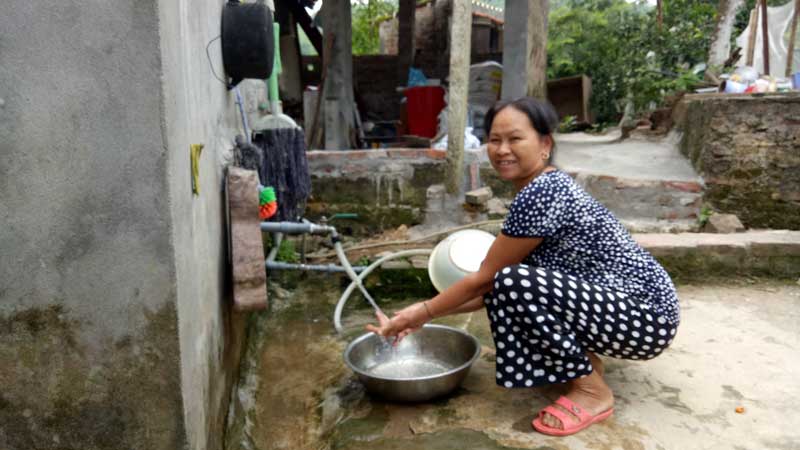
(HBO) – Yen Mong commune has implemented eight social policy credit programmes providing local villagers soft loans with total outstanding debt of more than 8.7 billion VND with 482 borrowers.

Provided with soft loans by the Bank
for Social Policies of Hoa Binh city, Nguyen Thi Lam and her family in Moi Mit
village, Yen Mong commune had money to build their own clean water supply and
sanitation facilities, improving their living conditions.
Among projects provided with soft loans under the eight social
policy credit programmes, those in clean water supply and environmental
sanitation have received over 4.6 billion VND, or 52.9 percent of the total
outstanding debt, the highest level. More than 1.8 billion VND went to production
and business projects while job creation programmes have been offered about 700
million VND.
Overdue debts accounted for 0.08 percent of the outstanding debts.
The savings deposits by the credit programmes’ beneficiaries were worth nearly
500 million VND.
The commune has 14 groups responsible for verifying local
applicants for soft loans and supervising the use of loans.
To promote the effective use of the provided soft credit, the Bank
for Social Policy in Hoa Binh city has coordinated with local authorities and mass
organisations to review poor and near-poor households and policy beneficiary
families in need of loans and assess if they are qualified.
The city has not only offered preferential loans for people to
expand production but also organised training courses on farming techniques for
new crops and livestock and applying technology in agriculture. Local people
have been also encouraged to attend short-term vocational training courses to
equip themselves with knowledge and techniques to improve productivity.
The State’s preferential loans have fundamentally met the credit
demand of local people, Chairman of Yen Mong commune’s People’s Committee
Nguyen Huu Minh said.
The loans have helped create jobs for thousands of villagers, thus
lifting them out of poverty and improving their housing conditions. In
addition, they have enabled more local students to pursue higher education, he
added.
By the end of 2018, the commune’s poverty rate fell to 2.1 percent
and the per capita income reached 40 million VND per year./.
More than just an information technology teacher, Bui Van Nien is an inspiring figure who has nurtured the scientific curiosity and creative spirit of students in Vietnam’s ethnic minority communities.
Da Bac is the most disadvantaged mountainous district in Hoa Binh province, with ethnic minorities accounting for about 90% of its population. Over the past years, the district has mobilised resources to implement ethnic policies to improve the quality of life of local people.
In recent years, Hoa Binh province has consistently prioritised the protection, care, and education of children, particularly those from ethnic minorities and disadvantaged backgrounds, by creating a safe, healthy, and nurturing environment for their all-round development.
The Steering Committee for Tobacco Harm Prevention and Control of Hoa Binh province, in coordination with the Tobacco Harm Prevention and Control Fund, held a ceremony on May 28 in response to the World No Tobacco Day (May 31) and the National No Tobacco Week (from May 25 to 31). The event was chaired by Nguyen Van Toan, Standing Vice Chairman of the provincial People’s Committee and head of the Steering Committee.
Since 2021, the Center for Industrial Promotion and Industrial Development Consulting (CIIDC) under the Department of Industry and Trade has been implementing a school lighting model as part of the plan for using energy efficiently and economically in Hoa Binh Province in the pẻiod of 2021 - 2025. This model not only aims to improve the learning conditions and enhance the education quality, but it also promotes the message of energy saving, energy security, environmental protection and contributes to the goals of socio-economic development.
In the 2024 - 2025 school year, the entire Hoa Binh provincial education sector includes 520 educational institutions and schools. Among them are 13 ethnic boarding schools with 153 classes and 4,487 students. Four of these schools have met national standards, reaching 30.7 percent.



